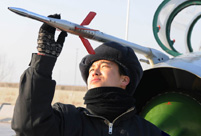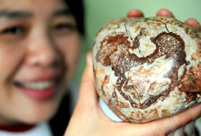 Int'l Snow Sculpture Art Expo in Harbin
Int'l Snow Sculpture Art Expo in Harbin Sichuan money wall for dividend payment
Sichuan money wall for dividend payment Li Na crashes Belinda Bencic in 2nd round at Australian Open
Li Na crashes Belinda Bencic in 2nd round at Australian Open
 Shocking moments when PLA's weapons open fire
Shocking moments when PLA's weapons open fire Famous Lanzhou beef noodles
Famous Lanzhou beef noodles Armed Police hold anti-terrorism drill in SE China's Xiamen
Armed Police hold anti-terrorism drill in SE China's Xiamen Harbin Int'l Ice and Snow Festival opens
Harbin Int'l Ice and Snow Festival opens 'Jin' named the word of the year by cross-strait netizens
'Jin' named the word of the year by cross-strait netizens Chinese scientific expedition goes to build new Antarctica station
Chinese scientific expedition goes to build new Antarctica station
HAIKOU, Jan. 22 -- New water facilities at a rural school on Hainan Island, China's southernmost province, has benefited more than 2,000 students and staff at the school.
The installation in Siyuan School, Chengmai County, uses ultra-filtration membranes to clean groundwater, allowing students to drink water straight from the faucet for the first time. Students have had to bring boiled water from home for years.
In Chengmai County alone, 50 schools and 155 villages will soon have fresh drinking water using the method, a total of 315,000 residents, 90 percent of the county's rural populace.
China is campaigning hard to promote rural drinking water safety. Polluted water is one of the main causes of poor health in rural areas, and the government has promised universally safe drinking water in rural areas, where about 100 million people still go without, by 2015, according to Li Guoying, vice minister of water resources.
The staggering economic expansion of the past three decades has led to serious water pollution. In 2012, China discharged almost 70 billion tonnes of waste water, polluting 57.3 percent of 4,929 monitored groundwater sites across the country.
Improvements to the drinking water supply in rural China have been slow in coming. The rural population is widely scattered across many geographically isolated villages that are difficult to serve.
"These filters allow us to set up water treatment works on a small scale with low installation and operating costs," said Li Guibai of the Chinese Academy of Engineering.
In tests, water treated by the membranes -- produced by Hainan's own Litree Purifying Technology Co. -- surpass the national quality standard.
Compared to traditional chemical methods which remove bacteria, ultra-filtration removes even viruses without chemical agents. With its pore size one of ten thousandth of the width of a human hair, they can filter out dissolved compounds with high molecular weight, Li said.
In 2004, Hainan's first ultra-filtration project was set up in Chengmai's Yongtang, a village of only 40 households. Stable operation of the facilities for eight years led to expansion of the project in 2012.
Between 2012 and 2013, Hainan invested 130 million yuan (about 21.5 million U.S. dollars) installing 276 facilities which now provide safe drinking water for 600,000 residents in 17 out of its 19 administrative regions.
"Chengmai was the first county to make widespread use ultra-filtration, pointing the way to a solution to rural drinking water problems nationwide," said Liu Wenchao, chief engineer of the rural drinking water safety center at the Water Resources Ministry.
Although ultra-filtration is a universal technology, adaptation is still necessary for different water conditions in different regions, the engineer said, adding that protection of water sources and training of professionals are prerequisites for the long-term use of the system in remote regions.
China allocated nearly 180 billion yuan for construction of rural drinking water projects from 2005 to 2012. Friday's new regulation on water safety by the National Development and Reform Commission urges coordination between central government and local authorities.
 Su-30 fighter formation taking off for training
Su-30 fighter formation taking off for training  Xuelong carries on mission after breaking from floes
Xuelong carries on mission after breaking from floes Charity exhibition raises money for panda protection
Charity exhibition raises money for panda protection 'Map of China' on the stone
'Map of China' on the stone  Chinese naval escort taskforce repels 4 suspicious vessels
Chinese naval escort taskforce repels 4 suspicious vessels World's weekly photos (1.6-1.12)
World's weekly photos (1.6-1.12) Li Na crashes Belinda Bencic in 2nd round at Australian Open
Li Na crashes Belinda Bencic in 2nd round at Australian Open Weekly sports photos
Weekly sports photos China's national pole dancing to play 'The Butterfly Love'
China's national pole dancing to play 'The Butterfly Love'  The never-ending Silk Road
The never-ending Silk Road  Spring Festival travel rush: One window, one world
Spring Festival travel rush: One window, one world Int'l Snow Sculpture Art Expo in Harbin
Int'l Snow Sculpture Art Expo in Harbin China photographs internal structure of water molecule
China photographs internal structure of water molecule 'Predator' makes proposal to girlfriend
'Predator' makes proposal to girlfriend Thousands of fish frozen on Norway sea
Thousands of fish frozen on Norway seaDay|Week|Month